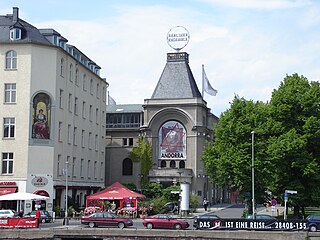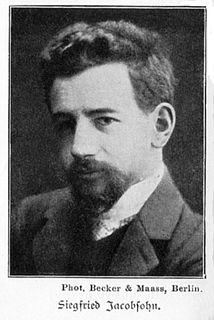
John Heartfield was a German visual artist who pioneered the use of art as a political weapon. Some of his most famous photomontages were anti-Nazi and anti-fascist statements. Heartfield also created book jackets for book authors, such as Upton Sinclair, as well as stage sets for contemporary playwrights, such as Bertolt Brecht and Erwin Piscator.

Friedrich Wilhelm Ernst Busch was a German singer and actor.

Epic theatre is a theatrical movement arising in the early to mid-20th century from the theories and practice of a number of theatre practitioners who responded to the political climate of the time through the creation of a new political theatre. Epic theatre is not meant to refer to the scale or the scope of the work, but rather to the form that it takes. Epic theatre emphasizes the audience's perspective and reaction to the piece through a variety of techniques that deliberately cause them to individually engage in a different way. The purpose of epic theatre is not to encourage an audience to suspend their disbelief, but rather to force them to see their world as it is.

Heiner Müller was a German dramatist, poet, writer, essayist and theatre director. His "enigmatic, fragmentary pieces" are a significant contribution to postmodern drama and postdramatic theatre.

Alfred Kerr was an influential German theatre critic and essayist of Jewish descent, nicknamed the Kulturpapst.

Karl August Wittfogel was a German-American playwright, historian, and sinologist. He was originally a Marxist and an active member of the Communist Party of Germany, but after the Second World War Wittfogel was an equally-fierce anticommunist.

Georg August Friedrich Hermann Schulz, better known as Heinrich George, was a German stage and film actor.

The Berliner Ensemble is a German theatre company established by actress Helene Weigel and her husband, playwright Bertolt Brecht, in January 1949 in East Berlin. In the time after Brecht's exile, the company first worked at Wolfgang Langhoff's Deutsches Theater and in 1954 moved to the Theater am Schiffbauerdamm, built in 1892, that was open for the 1928 premiere of The Threepenny Opera.

Karl Valentin was a Bavarian comedian, cabaret performer, clown, author and film producer. He had significant influence on German Weimar culture. Valentin starred in many silent films in the 1920s, and was sometimes called the "Charlie Chaplin of Germany". His work has an essential influence on artists like Bertolt Brecht, Samuel Beckett, Loriot and Helge Schneider.

Slatan Theodor Dudow was a Bulgarian born film director and screenwriter who made a number of films during the Weimar Republic and in East Germany.

Siegfried Jacobsohn was a German writer and influential theatre critic.

The Theater am Schiffbauerdamm is a theatre building at the Schiffbauerdamm riverside in the Mitte district of Berlin, Germany, opened on 19 November 1892. Since 1954, it has been home to the Berliner Ensemble theatre company, founded in 1949 by Helene Weigel and Bertolt Brecht.
Peter Zadek was a German director of theatre, opera and film, a translator and a screenwriter. He is regarded as one of the greatest directors in German-speaking theater.

Eugen Berthold Friedrich Brecht, known professionally as Bertolt Brecht, was a German theatre practitioner, playwright, and poet. Coming of age during the Weimar Republic, he had his first successes as a playwright in Munich and moved to Berlin in 1924, where he wrote The Threepenny Opera with Kurt Weill and began a lifelong collaboration with the composer Hanns Eisler. Immersed in Marxist thought during this period, he wrote didactic Lehrstücke and became a leading theoretician of epic theatre and the so-called V-effect.

The Berliner Börsen-Courier was a German left-liberal daily newspaper published from 1868 to 1933. It focused primarily on prices of securities traded on the stock exchanges and securities information about the mortgage market, but also featured news and reports from industry, commerce, politics and culture. It was subtitled: moderne Tageszeitung für alle Gebiete.
Otto Zoff was an Austrian author, script writer, dramaturge, journalist and "all-round Bohemian". For reasons of politics and race he spent much of his life abroad, including almost twenty years as an immigrant in the United States of America. During his lifetime he was noted, in particular, for his drama compositions and historical monographs, but fifty years after his death he had for most purposes fallen out of fashion.
Rudolf Sellner, born Gustav Rudolf Sellner? was a German actor, dramaturge, stage director, and intendant. He represented in the 1950s a radical Instrumentales Theater. After decades of acting and directing plays, he turned to staging operas, and was a long-time intendant of the Deutsche Oper Berlin from 1961, when the Berlin Wall was built. He staged notable world premieres, including Ernst Barlach's play Der Graf von Ratzeburg in 1951, Ionesco's Mörder ohne Bezahlung in 1958, Giselher Klebe's Alkmene in 1961 for the opening of the Deutsche Oper, and Aribert Reimann's opera Melusine in 1971.

Peter Palitzsch was a German theatre director. He worked with Bertolt Brecht in his Berliner Ensemble from the beginning in 1949, and was in demand internationally as a representative of Brecht's ideas. He was a theatre manager at the Staatstheater Stuttgart and the Schauspiel Frankfurt. Many of his productions were invited to the Berliner Theatertreffen festival. He worked internationally from 1980.

Hainer Hill was a German scenic designer, costume designer, painter, graphic artist and theatre photographer who was based in Berlin and worked internationally. After studying painting in Frankfurt, he worked at the Oper Frankfurt, assisting Caspar Neher. Together they moved to Brecht's Berliner Ensemble where Hill created an iconic stage for Mutter Courage and took hundreds of scene photographs now archived at the Akademie der Künste. When the Berlin Wall was erected, Hill, who lived in the West and had worked in the East, began to work freelance, including at the Royal Opera House. In 1966 he became director of scenery (Ausstattunggsleiter) at Opernhaus Dortmund, and there he created the stage for the world premiere of Eli by Walter Steffens, which was followed by 45 other productions. Hill is best remembered for his focus on light projection.
Ruth Wilhelmi-König was a German woman stage photographer.















